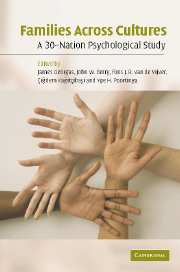Book contents
- Frontmatter
- Contents
- List of figures
- List of tables
- List of contributors
- Acknowledgments
- Prologue
- Part I
- Part II
- 9 The Algerian family: change and solidarity
- 10 Botswana
- 11 The Brazilian jeitinho: Brazil's sub-cultures, its diversity of social contexts, and its family structures
- 12 Britain
- 13 Bulgaria: socialism and open-market economy
- 14 Canada
- 15 Chile: new bottle, old wine
- 16 Cyprus
- 17 Portrait of family in France
- 18 Georgia
- 19 Germany: continuity and change
- 20 Ghana
- 21 Greece
- 22 Hong Kong, SAR China: transitions and return to the motherland
- 23 India
- 24 Indonesia: traditional family in a changing society
- 25 The Iranian family in a context of cultural diversity
- 26 Japan: tradition and change in the Japanese family
- 27 Mexico
- 28 Mongolia: traditions and family portrait
- 29 The Netherlands: tolerance and traditionalism
- 30 Nigeria
- 31 Pakistan: culture, community, and filial obligations in a Muslim society
- 32 The Saudi society: tradition and change
- 33 The South African family
- 34 South Korea
- 35 Spain: tradition and modernity in family structure and values
- 36 Turkey
- 37 Ukraine
- 38 Family in the United States: social context, structure, and roles
- Appendix
- References
- Index
12 - Britain
Published online by Cambridge University Press: 10 December 2009
- Frontmatter
- Contents
- List of figures
- List of tables
- List of contributors
- Acknowledgments
- Prologue
- Part I
- Part II
- 9 The Algerian family: change and solidarity
- 10 Botswana
- 11 The Brazilian jeitinho: Brazil's sub-cultures, its diversity of social contexts, and its family structures
- 12 Britain
- 13 Bulgaria: socialism and open-market economy
- 14 Canada
- 15 Chile: new bottle, old wine
- 16 Cyprus
- 17 Portrait of family in France
- 18 Georgia
- 19 Germany: continuity and change
- 20 Ghana
- 21 Greece
- 22 Hong Kong, SAR China: transitions and return to the motherland
- 23 India
- 24 Indonesia: traditional family in a changing society
- 25 The Iranian family in a context of cultural diversity
- 26 Japan: tradition and change in the Japanese family
- 27 Mexico
- 28 Mongolia: traditions and family portrait
- 29 The Netherlands: tolerance and traditionalism
- 30 Nigeria
- 31 Pakistan: culture, community, and filial obligations in a Muslim society
- 32 The Saudi society: tradition and change
- 33 The South African family
- 34 South Korea
- 35 Spain: tradition and modernity in family structure and values
- 36 Turkey
- 37 Ukraine
- 38 Family in the United States: social context, structure, and roles
- Appendix
- References
- Index
Summary
A HISTORICAL OUTLINE OF BRITAIN
Great Britain (England, Scotland, and Wales) forms part of the United Kingdom, which also includes Northern Ireland. The name “Britain” is probably derived from Celtic origin, reflecting Celtic rule in pre-Roman times. Britain was ruled by Rome from AD 43 to AD 409 and was last successfully invaded by the Normans in 1066. The second half of the twentieth century witnessed the dismantling of the British Empire and the rebuilding of the United Kingdom into a modern European nation. The United Kingdom was a founding member of the United Nations and of the Commonwealth, is one of the five permanent members of the Security Council, and has been a member of the European Union since 1973.
Britain's current population is approximately 60 million, of whom one in six are over 65 years old. One in fifteen of Britain's inhabitants are from non-white ethnic groups. Nearly half of them were born in Britain from parents who had emigrated from the former British colonies in Africa, Asia, and the Caribbean since the 1950s.
ECOLOGICAL FEATURES
Britain is an island situated in northwestern Europe, surrounded by the Atlantic Ocean, English Channel and the North, Celtic, and Irish Seas. The landscape is varied, from the mountains of Wales, Scotland, and Northern England, through the flat expanses of the Midlands and Eastern England to the rolling hills of the South. The climate is generally cool to mild with frequent cloud and rain.
- Type
- Chapter
- Information
- Families Across CulturesA 30-Nation Psychological Study, pp. 267 - 274Publisher: Cambridge University PressPrint publication year: 2006
- 1
- Cited by



